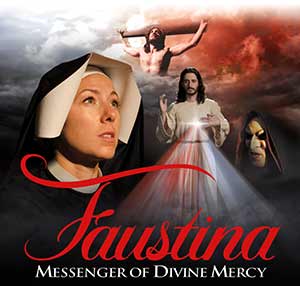What’s the difference between a stage actor and an evangelist?
 St. Luke Productions’ touring stage production of “Faustina: Messenger of Divine Mercy,” will be performed at St. Jerome, Oconomowoc, April 7, and St. Elizabeth, Kenosha, April 8. (Submitted photo courtesy St. Luke Productions)Its not the set-up for a joke for Leonardo Defilippis and his team at St. Luke Productions, the two are one and the same.
St. Luke Productions’ touring stage production of “Faustina: Messenger of Divine Mercy,” will be performed at St. Jerome, Oconomowoc, April 7, and St. Elizabeth, Kenosha, April 8. (Submitted photo courtesy St. Luke Productions)Its not the set-up for a joke for Leonardo Defilippis and his team at St. Luke Productions, the two are one and the same.
They know the arts can be one of the most compelling ways to bring people into contact with the Gospel, and have spent the last 34 years putting their gifts at the service of this mission.
On April 7 and 8, St. Luke Productions will bring its touring stage production of “Faustina: Messenger of Divine Mercy” to two parishes, St. Jerome, Oconomowoc, and St. Elizabeth, Kenosha, sharing the story of Gods mercy in a unique way.
Defilippis, who founded St. Luke Productions in 1980, started his career as a successful stage actor focusing on the works of Shakespeare. Though raised Catholic, faith was not a part of his life.
“I really wasn’t practicing my faith; I wasnt integrating my faith at the time, even though I had an idealistic heart and wanted to do great artistic work,” Defilippis said.
After experiencing a powerful re-conversion to Catholicism, he found himself grappling with how to put his career in theater in the context of his newfound relationship with God.
“I had to deal with – how do I integrate my artistic desires with my faith and my morals?” Defilippis said.
Month at a monastery
At first, he considered a call to the priesthood, and spent a month at a monastery for a period of prayer and discernment. While there, he got a request that changed the course of his life: to put together a stage production about the life of St. Francis for a conference at the monastery that summer.
Three decades later, Defilippis life is dedicated full time to St. Luke Productions, a film and theater  Maria Vargo, a native of St. Louis, portrays St. Faustina in St. Luke Productions’ touring stage production of “Faustina: Messenger of Divine Mercy.” Vargo, who was raised Catholic and experienced God’s call to a deeper relationship in 2008, will perform live, interacting with video of other performers projected onto a large screen. (Submitted photo courtesy St. Luke Productions)production company based in Washington State that focuses on stage dramas telling stories of faith.
Maria Vargo, a native of St. Louis, portrays St. Faustina in St. Luke Productions’ touring stage production of “Faustina: Messenger of Divine Mercy.” Vargo, who was raised Catholic and experienced God’s call to a deeper relationship in 2008, will perform live, interacting with video of other performers projected onto a large screen. (Submitted photo courtesy St. Luke Productions)production company based in Washington State that focuses on stage dramas telling stories of faith.
“It’s an amazing journey, really,” he said. “I went from doing normal artistic works to doing works that have never been created and characters that have never been explored, maybe in artistic history.”
Defilippis said St. Luke Productions has focused on the lives of saints because of the compelling nature of their stories.
“When we do the saints, youre talking about the greatest characters that have walked the face of the earth,” he said. “When you look at somebody like Therese of Lisieux or Francis of Assisi, their impact is far greater through generations and centuries.”
To create the current show about the life of St. Faustina, Defilippis immersed himself in Faustinas writings and story, particularly the lengthy diary that contains her accounts of her visions of Jesus. He also wove in several stories of modern characters in order to connect Faustinas story with contemporary audiences.
Who would play Faustina?
After the research and writing were completed, one of the most important steps remained: the casting process to select the actress who would portray Faustina.
Maria Vargo, eventually cast in the role, has her own story of Gods guidance toward a life of faith-based theater. She was raised Catholic, but in early adulthood was not living out her faith in her day-to-day life.
“I was straddling both sides of the fence,” she said. “I knew I was a child of God, but that was not being reflected in all the actions in my life.”
In 2008, Vargo experienced Gods call to a deeper relationship with him.
“It was as if he was tapping me on the shoulder,” she said. “I kept saying, ‘I’m not ready yet, Im not ready.’ Then finally I turned around I wanted to use my gifts and talents to serve the Lord.”
Vargo, who had been working for years as a professional film and stage actor, wanted to find ways to share how God had been active in her life particularly the way she had experienced his mercy.
That opportunity presented itself when she was connected through a friend with St. Luke Productions and was cast as St. Faustina.
Preparing for the role was an intense and spiritually enriching process, starting with five days spent with Faustinas religious order, the Sisters of Our Lady of Mercy, in Massachusetts.
“It’s been beautiful,” Vargo said. “I really have to rely on her, asking her intercession.”
Because not a lot is known biographically about St. Faustina, Vargo said she clung to every detail she could learn about the saints life and personality. She said Faustina was “joyful… and a great storyteller, and feisty a little bit.”
Multimedia component to production
The production itself has a multimedia component, with Vargo performing live and interacting with video of other performers projected onto a large screen.
Vargo originally found the technology challenging.
“Never having worked with anything like that before, I think I had some resistance to it in the beginning,” Vargo said. “We had to figure out what worked.”
“It really creates a dynamism and an illusionits… quite an inventive art form,” said Defilippis. “It’s been a fascinating artistic project and has been well received.”
He said Vargo is really stellar and is just a great actress. She’s able to play this modern woman and then you have her play Faustina. You really see her versatility.
Having a single actor interacting directly with the audience is particularly powerful.
When the actor is looking right at you you become the other character, and its very compelling, Defilippis said.
For Vargo, playing St. Faustina is a once-in-a-lifetime opportunity.
“You don’t get too many opportunities to play characters that you truly are in line with,” she said. “One woman said to me, You are not acting; you gave it your whole heart and soul. Its true – I can’t not sink every ounce of passion that I have into what I’m saying, because I believe in it. And thats an awesome experience… to do a role like that, because it doesnt happen that often.”
Vargo says life on the road can be exhausting, but the rewards more than make up for the challenges of touring.
“When you perform, and see the people afterwards and how theyre affected, it’s worth it,” she said. “It’s a sacrifice, but its worth it.”
“You can see the emotions in peoples eyes,” Vargo said. “People are inspired the intertwining of not only her story but the modern stories is something that makes it really relevant for people. You never know exactly what touched them, but Ive definitely had people say to me different things about their lives being changed or that theyre not going to see things in the same way they did before.”
Response to call to New Evangelization
Defilippis sees the work of St. Luke Productions as a response to Blessed John Paul IIs call to the New Evangelization.
John Paul II, who was himself an actor and playwright before pursuing a vocation to the priesthood, spoke and wrote frequently about the role of the arts in the church and in the spreading of the Gospel. His words have resonated deeply with Defilippis and inspired him in his own work.
“I realized that what we need to get back to is one of the titles of the church as the Mother of the Arts,” he said.
Defilippis believes that, though there has been a revival in Catholic art in many areas, lots of opportunity exists.
“The arts are very important, underrated in a lot of ways,” he said. “If we take a step out we can see how powerful they are and how they are shaping our society right now.”
Defilippis said the arts can reach people in a way few other things can, even those for whom faith is not a big part of their lives.
“You take that positive energy where people love the arts, and you just have to infuse that connection with faith,” he said.
Live theater, Defilippis believes, is one of the most effective ways to forge this connection.
“The most personal and the most powerful impact,” he said, “will always come live face-to-face encounter.”
